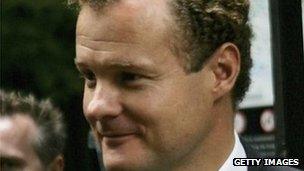Profile: Lord Rothermere, Jonathan Harmsworth
- Published

Jonathan Harmsworth, better known as Lord Rothermere, is the chairman of Daily Mail and General Trust (DMGT), which owns newspapers including the Daily Mail, the Mail on Sunday and Metro.
The 45-year-old is the fourth Viscount Rothermere, and inherited the chairmanship of DMGT at the age of 30 on the death of his father in 1998.
His great-grandfather, Harold Sidney Harmsworth, set up the Daily Mail along with his brother in the late 19th Century and was made the first Viscount Rothermere in 1919.
Harold Harmsworth made the Mail a very popular newspaper, but has been criticised for supporting Adolf Hitler as the Nazi party rose to power in Germany.
The current Lord Rothermere, whose father and grandfather were both chairmen of DMGT, has a history degree from Duke University in the US and was managing director of the Evening Standard before taking his current role.
A multinational group, DMGT's operations extend far beyond journalism and include risk management, events and ownership of brands such as Wowcher and property website Zoopla.
Lord Rothermere appeared third on the Sunday Times Rich List "media top 20" in 2012, with an estimated wealth of £760m.
Middle England
In evidence to the Leveson Inquiry into press culture, practice and ethics, he stated his role was not to "operationally manage" the company.
He said he tried to "protect the independence" of editorial staff, and said Daily Mail editor Paul Dacre ensured the paper "reflects the views of his readership" - which he agreed were accurately described as "the values of Middle England".
Lord Rothermere rarely gives interviews, but in 2004 he told the Independent his views were "not necessarily" those of the Daily Mail, but said he did not have the right to "second-guess" his editors.
He provided Lord Leveson with details of numerous lunches and dinners with politicians including Tony Blair, Gordon Brown, David Cameron and Nick Clegg.
Asked why politicians wanted to meet him, he said they "sometimes feel the paper's been hard on them" and asked him to "have some sort of influence".
He said he would usually "refer them back to Paul Dacre" but would sometimes raise an issue with the editor if a complaint appeared to have "merit".
Like Mr Dacre, he told the inquiry there had been no phone hacking by journalists at the company's papers, and argued that self-regulation "protects the press from political interference".
In an article on Lord Rothermere, the Guardian's Roy Greenslade wrote that he "has laboured for years under the impression that Daily Mail editor Paul Dacre is some kind of irreplaceable journalistic genius".
According to Mr Greenslade, the DMGT chairman "has ignored the legion of complaints about the Mail's nastiness" and "never betrayed any sign of concern about the criticisms".
'Warring editors'
Geordie Greig's appointment as editor of the Mail on Sunday in 2012 sparked rumours he was being groomed as Mr Dacre's successor, but quotes from Lord Rothermere in Tatler magazine's October 2013 edition said Mr Dacre had signed a new contract.
A former DMGT staff member told the BBC Lord Rothermere is known to dislike stories which bring his papers into disrepute.
The former employee said Mr Greig had been brought in because he had a "softer" approach than Mr Dacre, but the result was intense competition between the Daily Mail and the Mail on Sunday - driven by their "warring editors".
In September 2013, the Daily Mail published an article headlined "the man who hated Britain" about Ralph Miliband, the late father of Labour leader Ed Miliband - who called the story a "lie".
The Mail stood by its article but apologised for using a picture of Ralph Miliband's tombstone with the pun "grave socialist" on its website.
A few days later Lord Rothermere wrote to Mr Miliband to apologise "unreservedly" after a Mail on Sunday journalist arrived uninvited at a memorial service for his uncle, seeking information.
Mr Miliband said the apology was not enough and said Lord Rothermere must investigate the "culture and practices" of journalists at his newspapers.
- Published4 October 2013
- Published3 October 2013
- Published2 October 2013
- Published23 April 2012
- Published16 March 2012
- Published14 July 2011
- Published8 September 1998